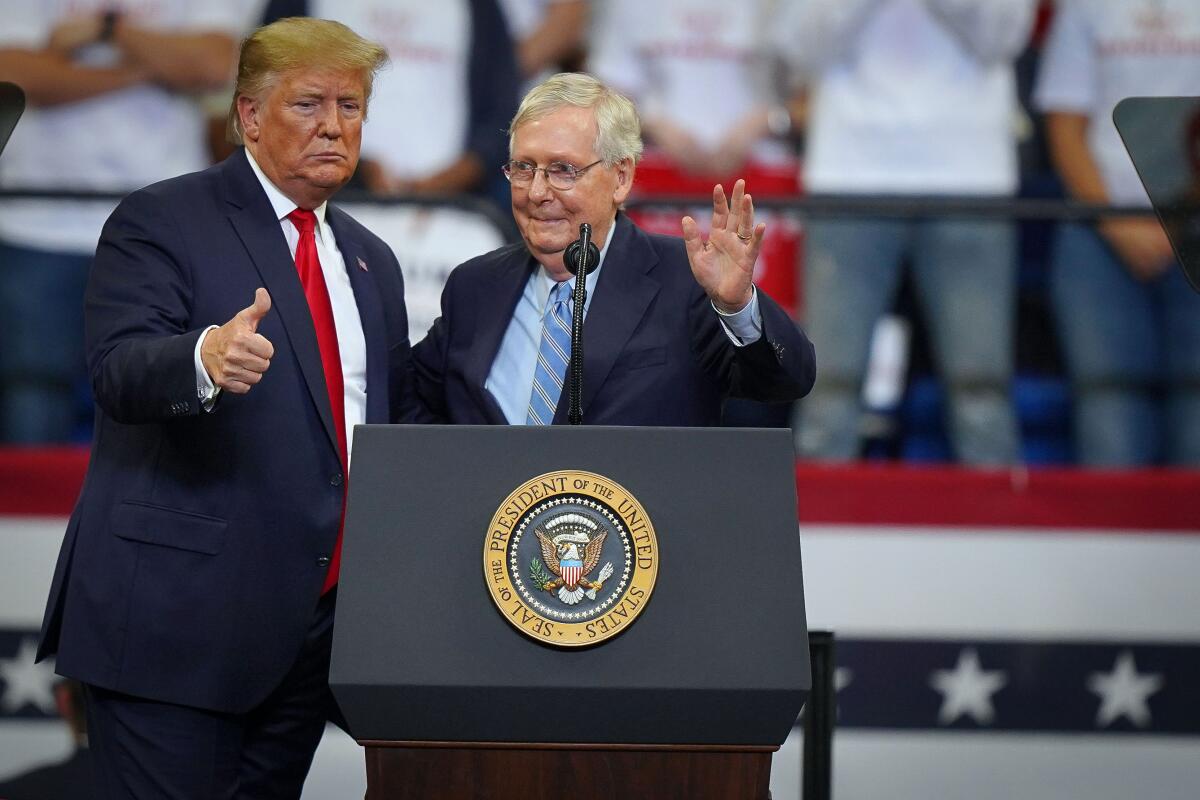Republicans see warning signs after losses in several states

- Share via
WASHINGTON — Off-year election results in three key states — Pennsylvania, Virginia and Kentucky — serve as a flashing red warning light for Republicans worried that President Trump’s deep unpopularity outside rural areas may threaten their grip on the White House, the Senate and numerous state legislatures.
But in Washington, where Republicans are expected to ardently defend Trump when the first public hearings in the impeachment inquiry open next week, GOP lawmakers are unlikely to alter their approach, at least in the short term.
The statewide contests Tuesday inevitably reflected local candidates and conditions. But several races drew high-profile campaigners and millions of dollars in out-of-state contributions, and were widely seen as a test of voter enthusiasm and party momentum one year ahead of the 2020 election.
In many cases, they reflected Republican struggles in suburban areas that once were crucial to GOP advances.
“There are some canaries in the coal mine right now, and we in the party would do ourselves a favor by paying attention,” said Jim Merrill, a Republican consultant based in New Hampshire, where Democrats also made significant gains in local races. Some polls show Trump’s approval ratings have tanked in a state he lost by 0.4 percentage points in 2016.
Republicans sought to cast the apparent loss of the governor’s seat in Kentucky — Republican Matt Bevin trailed Democrat Andy Beshear on Wednesday by 5,100 votes with 100% of returns tallied — as an outlier, the result of an deeply unpopular incumbent who ran a bad race. Republicans won other statewide races there, they note.
But the race also showed the limits of the GOP’s increasing dependence on the president. On Monday, Trump held a raucous election eve rally with Bevin in Lexington, Ky., and sought to nationalize the governor’s race as a referendum on the impeachment battle roiling Washington, and on the president himself.
Trump told cheering supporters at the rally that a Bevin loss would send “a really bad message” and pleaded, “You can’t let that happen to me.” He looked to save face Wednesday, tweeting that the rally had given Bevin “at least 15 points,” a claim at odds with state polls.
For the president’s own reelection race — and for Republicans looking further ahead — the results in Virginia and Pennsylvania were more alarming. Trump lost Virginia in 2016 but pulled an upset in Pennsylvania, long a Democratic bastion.
Despite a scandal in Richmond this year that almost forced out the Democratic governor, Virginia Democrats on Tuesday won control of both chambers of the state Legislature, marking the first time since 1993 that the party will control the governorship and the legislative branch.
And in Philadelphia’s vast suburban counties, Democrats took control of local government in several longtime Republican strongholds, including Delaware County, which Democrats haven’t controlled since the Civil War, and Chester County, which has never had a Democrat-led council in its history.
Josh Holmes, a Republican strategist in Washington who worked for a decade as chief of staff for Senate Majority Leader Mitch McConnell (R-Ky.), sees those results as “huge warnings” for Republicans.
“What we’ve seen in the Trump era is suburban Republicans are a less reliable Republican vote than rural Democrats, and you can get away with it in states like Kentucky,” he said. “But it’s really hard to get away with it in states like Pennsylvania, where you have huge population numbers that just can’t be overcome in rural areas.”
These swing voters tend to be moderate, and Trump still could win them back if he successfully paints his opponent as an extremist who doesn’t reflect their values.
“There is not a single socialist among them, and they are probably horrified by the likes of Elizabeth Warren,” Holmes said. But many are high-income, highly educated and well-informed voters “who obviously have a big problem with the Republican Party right now.”
Some analysts said candidates who forge their own identities while not repudiating Trump — a tricky balance — are in the best position to win in swing states, where a big rally by the president may not matter as much.
Sens. Amy Klobuchar of Minnesota and Michael Bennet of Colorado, both moderate Democrats running for president, pointed to the win in Kentucky, where Beshear focused on pocketbook issues like healthcare and not the president, as evidence that a centrist candidate who appeals to suburban voters is the key to retaking the White House.
Still, while the election results may ease Democrats’ fears about their impeachment efforts backfiring politically, Republicans are unlikely to alter their calculations about sticking with the president.
Not one GOP House member voted last week for a Democratic resolution to start the public phase of the process, and Republican senators, who will serve as jurors in a potential trial, have mostly shrugged off mounting evidence that Trump froze $400 million in military aid to Ukraine in an effort to pressure its president to investigate Democrats, including potential 2020 rival Joe Biden.
“Impeachment is reinforcing the views of people who already disapprove of Donald Trump and having no effect on people who already approve of him,” said Whit Ayres, a Republican pollster. “That’s exactly what happened in 1998 with Bill Clinton’s impeachment, where attitudes about it became synonymous with his job approval.”
Impeachment is already “baked in,” with Republicans all but certain to acquit Trump if the House approves articles of impeachment, according to a senior GOP Senate aide who spoke on condition of anonymity to discuss internal assessments. Because the Democratic-led inquiry looks “nakedly political,” the aide said, it will be “very easy for GOP senators to vote” to leave him in office.
The political concern for Republicans, Ayres said, is in the long run, given that Tuesday’s results show “a reinforcement and even an acceleration” of what became clear in 2017 and 2018 elections: eroding GOP support among millennials and college-educated voters in America’s suburbs.
“In the long run, that’s a real problem for the Republican Party, because groups where we have gotten stronger are declining as a portion of the electorate,” he said. Exit polls in 2016 showed Trump did best among white, non-college-educated voters, and they remain crucial to his base support.
Trump held what amounted to a pep rally to buck up Republicans on Wednesday, inviting senators and top Cabinet officials to the White House to celebrate the more than 150 federal judges confirmed to lifetime appointments in the last three years.
The issue, more than any other, binds the party’s various factions and has helped Trump maintain strong support from Republicans.
Trump singled out senators for tenacity while several paid tribute to him for sticking by Brett M. Kavanaugh during his tumultuous confirmation process for the Supreme Court.
“It’s necessary to be a warrior, frankly,” the president said. “If you’re not, you’ve got a problem.”
More to Read
Get the L.A. Times Politics newsletter
Deeply reported insights into legislation, politics and policy from Sacramento, Washington and beyond. In your inbox three times per week.
You may occasionally receive promotional content from the Los Angeles Times.












